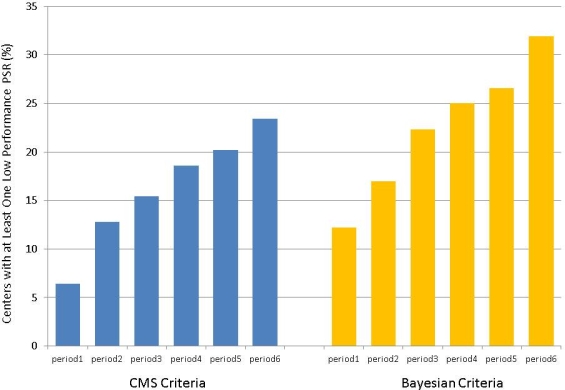Have We Gone Too Far Defining Performance Outliers? One-Third of Kidney Transplant Programs Now Identified for Low Performance within Three Years.
1Cleveland Clinic, Cleveland, OH
2Ohio State University, Columbus, OH
3University of Florida, Gainesville, FL.
Meeting: 2016 American Transplant Congress
Abstract number: 453
Keywords: Graft survival, Kidney transplantation, Multivariate analysis, Public policy
Session Information
Session Name: Concurrent Session: Living Donation and Transplant: Operational and Economic Factors
Session Type: Concurrent Session
Date: Tuesday, June 14, 2016
Session Time: 2:30pm-4:00pm
 Presentation Time: 3:42pm-3:54pm
Presentation Time: 3:42pm-3:54pm
Location: Room 311
Transplant center report cards developed by SRTR are publicly available and utilized for regulatory oversight and insurance contracting. There are significant associations of performance oversight with changes in transplant processes of care and declines in transplant volume. Our study aim was to quantify the incidence of low performance evaluations based on current MPSC and CMS standards
We used data from six consecutive biannual SRTR Program-Specific Reports (January,2013-July,2015) to evaluate the incidence of low performance ratings for 1-year graft or patient survival among US adult kidney transplant centers performing at least 10 transplants using publicly report SRTR outcome data.
Among adult kidney programs, 32%(60/188) had ≥1 low performance evaluation for one-year graft or patient survival based on current Bayesian criteria over the 3-year period. This proportion represented a 43% increase compared to current CMS standards 22%(40/188). Based on Bayesian criteria, the median differences in observed and expected graft and patient survival was -4.8% and -3.7% and median difference in observed and expected graft losses and deaths were 5.1 and 3.8 respectively for flagged PSRs.
Based on Bayesian criteria, the median differences in observed and expected graft and patient survival was -4.8% and -3.7% and median difference in observed and expected graft losses and deaths were 5.1 and 3.8 respectively for flagged PSRs.
Based on current Bayesian(MPSC) criteria, one-third of adult kidney transplant centers performing ≥10 transplants are identified as low performing in a three year time period in the US. Bayesian criteria have significantly increased low performing flagging relative to CMS criteria in this cohort. Given a primary goal of quality assurance, results question the value of identifying such a large proportion of centers as performance outliers with accompanying relatively small differences in observed and expected survival. Modification of performance criteria may both minimize the breadth of flagging, reduce risk adverse processes of care and potentially more efficiently allocate resources on centers with more dramatic differences in risk adjusted outcomes.
CITATION INFORMATION: Schold J, Miller C, Henry M, Buccini L, Flechner S, Goldfarb D, Poggio E, Andreonni K. Have We Gone Too Far Defining Performance Outliers? One-Third of Kidney Transplant Programs Now Identified for Low Performance within Three Years. Am J Transplant. 2016;16 (suppl 3).
To cite this abstract in AMA style:
Schold J, Miller C, Henry M, Buccini L, Flechner S, Goldfarb D, Poggio E, Andreonni K. Have We Gone Too Far Defining Performance Outliers? One-Third of Kidney Transplant Programs Now Identified for Low Performance within Three Years. [abstract]. Am J Transplant. 2016; 16 (suppl 3). https://atcmeetingabstracts.com/abstract/have-we-gone-too-far-defining-performance-outliers-one-third-of-kidney-transplant-programs-now-identified-for-low-performance-within-three-years/. Accessed February 27, 2026.« Back to 2016 American Transplant Congress
